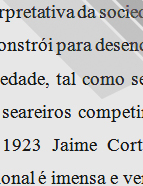

................................
Closer to a historical controversy was that in which Sérgio engaged in Seiscentismo (the 1600s), a lthough it had been interrupted by the death of António Sardinha, the other contender. (Múrias, O Seiscentismo ; Sardinha, O Século XVII [The Seventeenth Century] ; Sérgio, Seiscentismo). Lateral controversies of the central goal, which was to provoke society to implement the indispensable reforms: in the economy and in education. “What is pressing is to educate for and through work, to produce in order to educate and through education. The resolution of the two most serious problems – the educational and the economic – must be tackled simultaneously.” (Cortesão, in Cardia, Seara, vol. I, p. 256).
In addition to António Sérgio's interpretative essays, another type of investigative history also gained entry into Seara Nova : that which was due to Jaime Cortesão's discovery of historical research, which he began practising only in the early 1920s. (Magalhães, “No trilho” [“On the Trail”]). Not initially to support his civic and political actions, but as a historian embarking on a committed career in which his aim was to resolve some of the crucial problems of historiography, particularly source criticism. The turning point came in 1922 when he collaborated on História da Colonização Portuguesa do Brasil [History of the Portuguese Colonization of Brazil], directed by Carlos Malheiro Dias, from which a volume emerged titled A expedição de Pedro Álvares
Cabral e o Descobrimento do Brasil [The Expedition of Pedro Álvares Cabral and the Discovery of Brazil]. Structuring his thought through historical research, an article published in Lusitania. Revista de Estudos Portugueses [Lusitania. Journal of Portuguese Studies] would mark his position on sources and their treatment: “On national secrecy regarding the discoveries.” Seara Nova – to whose board Cortesão belonged - was attentive to this new direction and in 1922 published a paper presented to the Academy of Sciences in which Cortesão's principles were emphasised in the historical interpretation, especially the cosmopolitan nature of the discoveries. This cosmopolitanism reinforced the theory that the isolation of the Iberian Peninsula was one of the causes of Portugal's woes. Returning to cosmopolitanism was necessary in the fight for the country's moderni s ation. Without this openness to the outside world, it would not be possible. Cortesão significantly quoted Sérgio in this regard – who had not yet joined the Seara group: “The value of António Sérgio’s work mainly lies in providing a new and powerful argument for the now widely accepted theory that the Portuguese discoveries were carried out by an elite of thought and action, fully aware of their cosmopolitan interest, guided not only by creative audacity but by indispensable qualities of method and organisation.” (Cortesão, in Cardia, Seara, p. 336). The widespread acceptance of this idea was more of a hope than a reflection of reality, but it was aligned with the Seara Nova directors' doctrinal efforts.
